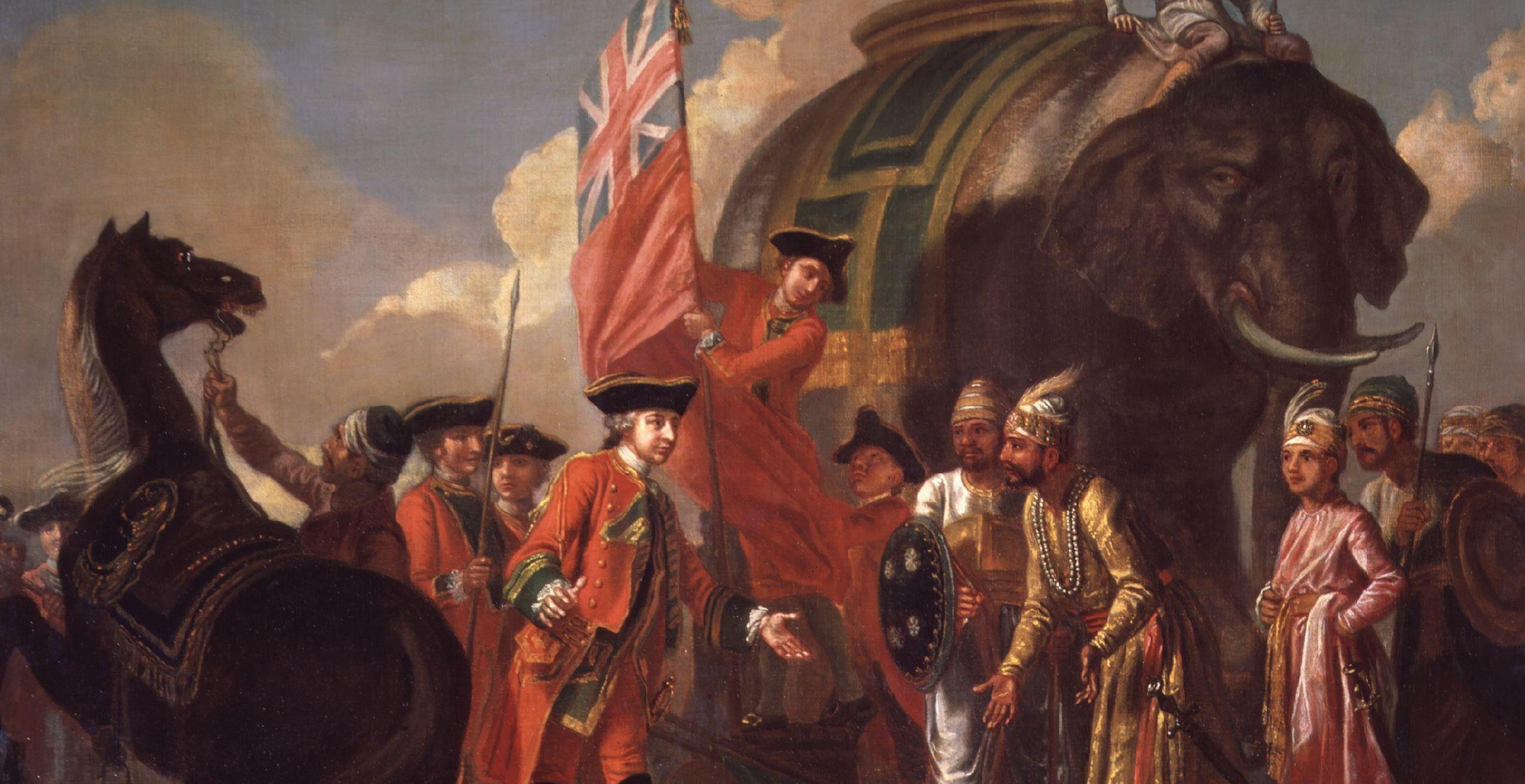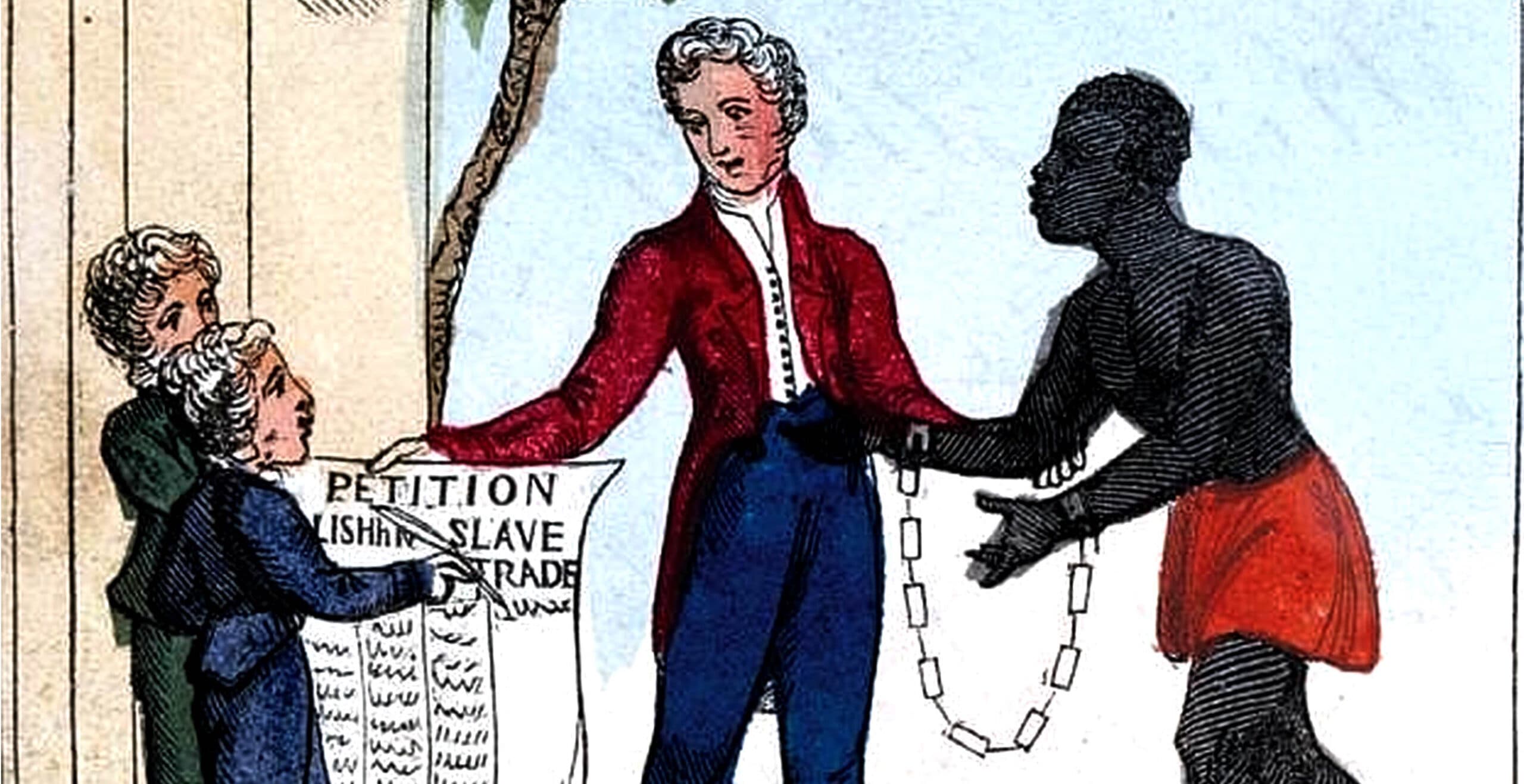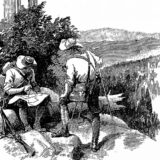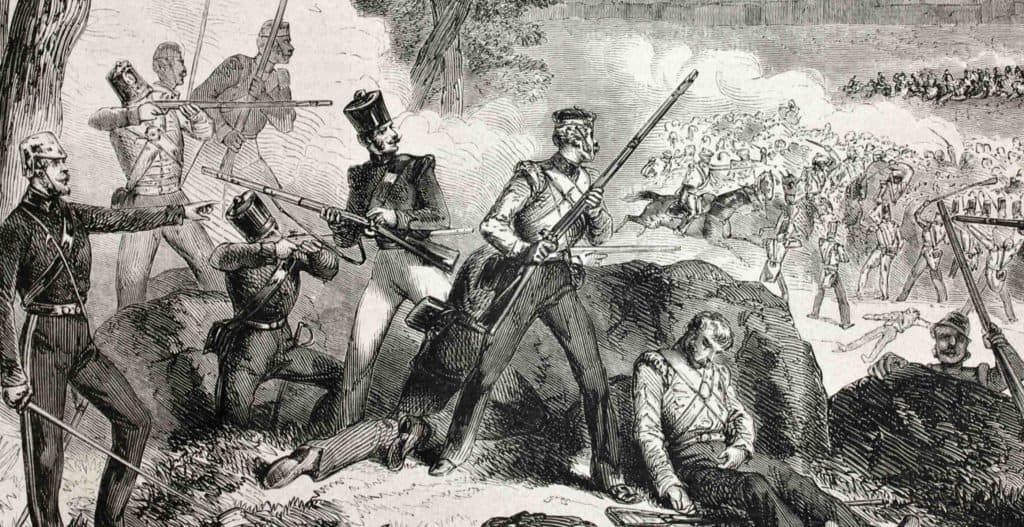“No taxation without representation”.
These were the words which best encapsulated the resistance to the 1773 Tea Act passed by the British Parliament.
In colonial Massachusetts, the opposition to the implementation of the Tea Act led to a wider call for representation and in doing so, precipitated the advent of the American Revolution whereby the very authority of the British government over American citizens was brought into question in an historic event which defined the future of both nations.

Originating out of economic struggles, the British government imposed taxation in the wake of the Seven Years’ War which had severely dented the government coffers.
Britain’s national debt was now up to £133 million, almost double what it had been and thus the authorities were looking for a way to mitigate the effects of the debt in the easiest way possible, thus turning their attentions to their assets abroad. The huge price of the international conflicts in which Britain participated was going to be paid for by the taxation imposed on its colonies.
The opposition to taxation had been steadily growing as sporadic protests had been occurring across Britain’s thirteen American colonies since the 1760s.
Unpopular parliamentary acts included the Stamp Act which was introduced in 1765 to impose a tax on every piece of paper used in the colonies, ranging from pamphlets to playing cards. The act however proved short-lived as American resistance to it quickly led to it being repealed.
Following the disaster of the Stamp Act, two years later the Townshend Acts (named after the then British Chancellor) was drawn up, introducing taxes for imported goods ranging from paper, to paint and tea.
In this instance, the money raised by these taxes would be used to supplement the salaries of colonial administrators, particularly the governors and judges, thus ensuring their loyalty and compliance.
These new acts produced hostile reactions from colonists leading in some cases to violent protests.
One of the important emerging figures in this resistance movement was the Sons of Liberty network, which began organising boycotts on British goods as well as using intimidation to target customs officials.
Throughout the latter half of the 1760s, tensions in the American colonies were on the rise and the British responded by sending in troops to Boston in order to enforce the Townshend Duties.
Such an authoritative crackdown did little to quell the resistance movement amongst locals who felt their rights were being eroded.
The apex of this confrontation came in 1770 with the Boston Massacre, when British soldiers shot dead five protesting colonists, thus cementing the negative view of many locals towards British control.
Britain felt its demands via taxes were not unreasonable, as much of the debt incurred through fighting was for the preservation of the territories overseas. The colonists however did not agree with the imposition of these sweeping tax reforms without the equal amount of governmental representation.
In the following years, the protest movement against these reforms grew and in some cases forced Britain to remove several of the taxes they had previously introduced.
In April 1772, in Weare, New Hampshire, a riot broke out in response to heavy fines issued to locals for harvesting trees. The protest thus became known as the Pine Tree Riot and was a precursor to the larger and most famous American tax revolt, the Boston Tea Party.
The following year, in May 1773 the Tea Act was passed, a lucrative taxation that would earn the British government almost £1.2 million a year.
As soon as it was introduced, it generated controversy as it allowed the East India Company to sell its tea to the colonies duty-free but allowed for the taxation of the importer when the tea reached the ports in their territories.
The East India Company at the time was in dire financial straits, particularly impacted by the famine in Bengal. The company was on the verge of bankruptcy and thus the Tea Act of 1773 was viewed by parliamentarians as a solution to this crisis.
The North Ministry passed the act which received the assent of King George on 10th May 1773. Designed to save the EIC, the Tea Act essentially allowed the company to reduce its costs by eradicating the role of the middlemen, permitting the company for the first time to export tea to the colonies on its own account.
In reality, the Tea Act generated controversy because it allowed the EIC to sell the tea at a lower price than before, undercutting colonial tea importers (as well as smugglers) who were forced to pay the tax and received no refund.
Whilst the government realised the politically sensitive nature of such a manoeuvre, they did little to assuage the fallout. The act was the final straw for the colonists who viewed it as an imposition on their liberties. The battle lines were drawn between loyalists and protesters.
By the end of the year, the first shipments were arriving in American ports including New York, Philadelphia, Charleston and of course, Boston.
The decision by some governors was to turn the ships around or quietly offload the tea into a holding warehouse to cool down the tensions. In Massachusetts this was not the case.
The Governor Thomas Hutchinson was viewed by many in his area as uncompromising in his determination to uphold British authority under any circumstances. When he saw the shipment he demanded that it should be unloaded, sold and the duties collected.
By December, the Sons of Liberty had rallied many protestors to the cause and were ready to take action against the taxation and the monopoly which the EIC now had on tea.
On the evening of 16th December 1773, a group of Bostonians met at the Old South Meeting House in a congregation later known as “the body of the people” to discuss the issue of the tea in the harbour.
Realising Governor Hutchinson’s unwavering position on the issue meaning that debate and coercion was out of the question, a leading figure of the Sons of Liberty called Samuel Adams was said to have cried out:
“This meeting can do nothing more to save the country”.
A crowd then amassed heading towards the harbour where the three EIC ships were docked. With some men boarding the ship (dressed as Native Americans) and others acting as look-outs, the tons of tea on-board were soon hoisted over the rails and sent crashing into the sea.
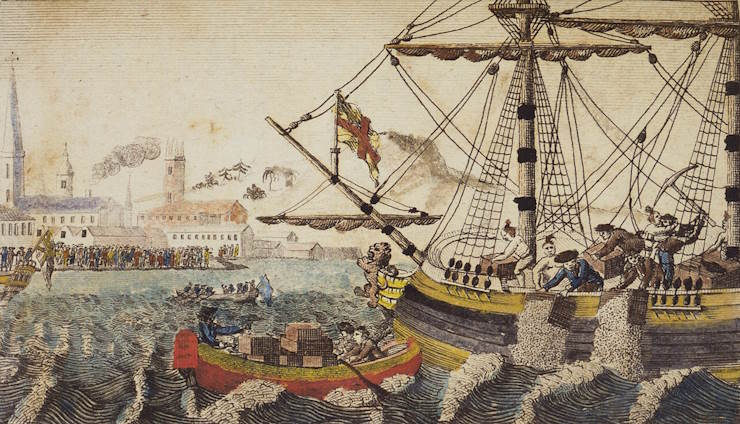
During the protest, it was believed that around £10,000 of EIC tea was dumped off the ships. Known as the Destruction of the Tea, the Boston Tea Party became a demonstration against taxation but also something much more significant, a turning point against British governance and the form it took, leading in large part to the entire revolutionary movement which soon gripped America.
The Boston Tea Party, whilst voiding enormous amounts of tea and thus precious profits for the British government, was however a mostly peaceful affair.
Other goods on-board the ships remained untouched and whilst a small amount of accidental disturbances occurred, the nature of the protest was strictly dictated by the objective of damaging the economic viability of the stock and therefore the policy as a whole.
Whilst the Boston Tea Party has since acquired legendary status as a precursor to the activities of the American Revolution, it did not in fact immediately lead to widespread opposition or a growing movement big enough to take on British authority. Instead, it was the subsequent response by the British government which did more to fan the revolutionary flames of the colonists.
Once the British discovered the destruction of tea at Boston Harbour, the government responded resolutely by introducing the Coercive Acts (or as they later became known the Intolerable Acts) in 1774.
The Acts’ sole purpose was to punish Massachusetts for displaying such an act of insurrection against British authority. One of the most significant of these acts was the introduction of the Boston Port Act which enforced a shutdown of the port at Boston until the money that was lost by the EIC was paid back. Effectively the act was nothing more than holding the entire city to ransom economically and showed the willingness of the British government to destroy Boston’s commercial success in order to not only recoup its losses but shame the citizens of the city into kowtowing to their authority.
Other acts passed which continued to show favour to British officials such as the Administration of Justice Act and the Quartering Act.
The Coercive Acts as they were collectively known, served to create deep-seated resentment amongst colonists and spurred on the meeting of the First Continental Congress held in Philadelphia in September 1774.

Local delegates in attendance would discuss the terms for a boycott and formally declared their desire to have the same rights as their fellow Englishmen.
During this meeting which was attended by delegates from all thirteen colonies except Georgia, it was also agreed to suspend trade with Great Britain.
Throughout 1774 opposition voices were growing stronger, forming alliances, attending meetings and under the strain of the Coercive Acts became emboldened to act faster and more boldly in defiance of the growing authoritarianism of British control in the American colonies.
In many ways the Boston Tea Party was the tipping point that led America down the path of independence, spurred on by the intransigent nature of British governance, which not only imposed its will on the colonies but did little to respect the voices and growing calls for representation.
The event was a marker in history, indicating a significant shift in public attitude towards Britain and America’s own colonial status.
It would take more time and much more bloodshed before such a dream could be achieved, however the Boston Tea Party was a significant step, accelerating the independence movement and thus defining the changing course of destiny for the two nations forever.
As summarised by one of the Founding Fathers John Adams:
“This Destruction of the Tea is so bold, so daring, so firm, intrepid and inflexible, and it must have so important Consequences, and so lasting, that I cant but consider it as an Epocha in History”.
Jessica Brain is a freelance writer specialising in history. Based in Kent and a lover of all things historical.
Published: 15th July 2024.




